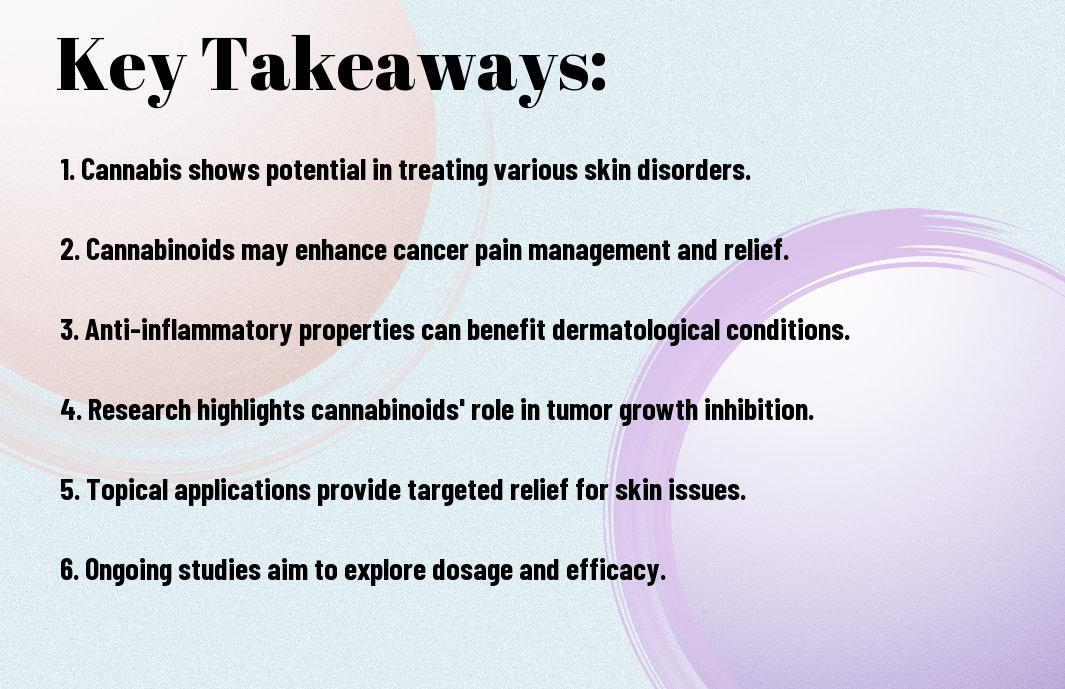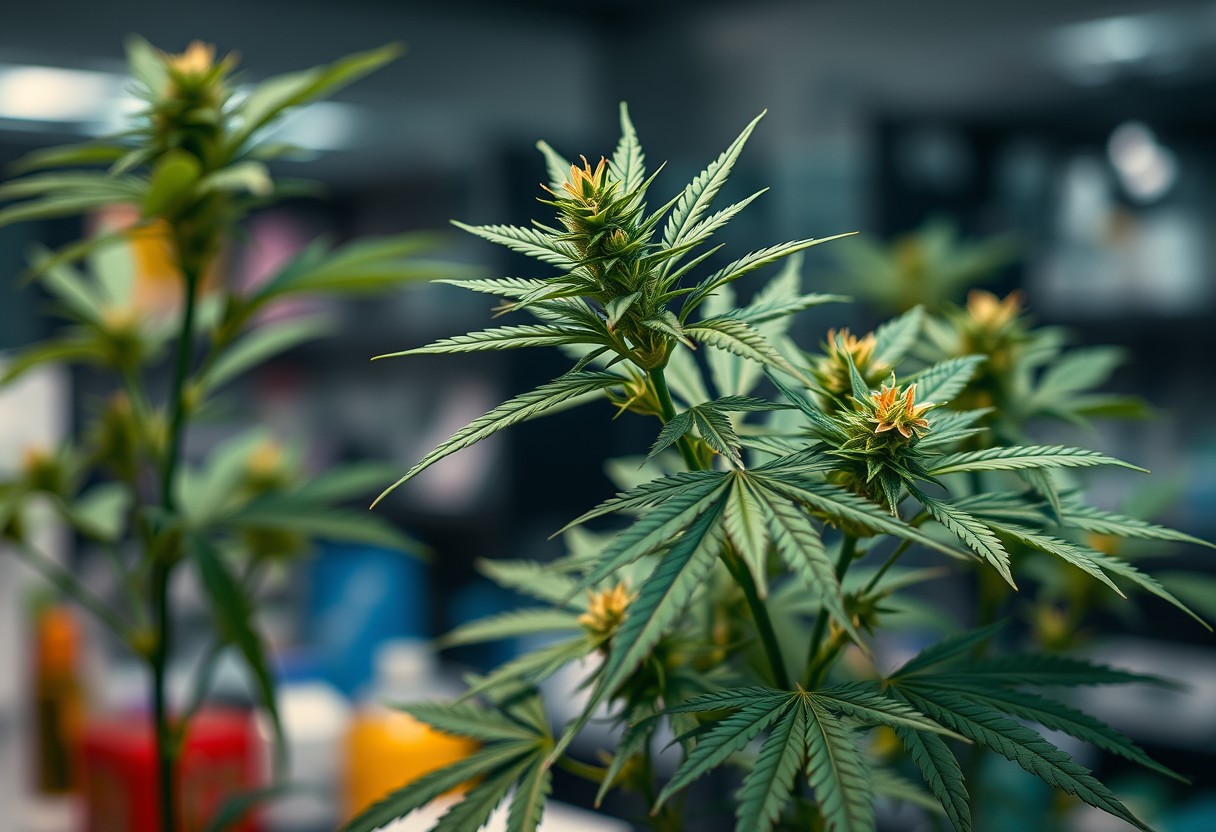The Promising Role Of Cannabis In Skin Disorders And Cancer Care

It’s increasingly clear that cannabis may play a transformative role in treating various skin disorders and enhancing cancer care. Recent studies highlight how cannabinoids could alleviate symptoms of conditions like psoriasis and eczema, showing potential for topical applications. For cancer patients, these compounds may aid in managing pain and nausea associated with treatments. As research evolves, findings, such as those in Cannabis-Based Treatments May Be Beneficial for Skin …, suggest a rich area for future exploration. They underscore the necessity of understanding the efficacy and safety of cannabis in improving patient quality of life.
Key Takeaways:
- Cannabis and Skin Disorders: Research highlights the potential of cannabis compounds in managing various skin disorders, including psoriasis and eczema, by reducing inflammation and promoting healing.
- Cannabinoids in Cancer Care: Cannabis cannabinoids show promise in improving the quality of life for cancer patients, particularly in alleviating pain, nausea, and anxiety associated with treatment.
- Need for Further Research: Despite positive findings, more comprehensive studies are necessary to fully understand the mechanisms and effectiveness of cannabis in dermatological and oncological treatments.

The Therapeutic Potential of Cannabis in Dermatology
The potential of cannabis in dermatology is gaining recognition for its therapeutic benefits in treating various skin conditions. Research indicates that the cannabinoids present in cannabis can modulate skin health, offering innovative treatment avenues for dermatoses, inflammatory conditions, and other skin disorders.
Cannabinoids and Skin Health
The cannabinoids found in cannabis, such as CBD and THC, possess properties that may improve skin health. They are known for their anti-inflammatory, antioxidant, and analgesic effects, which can help alleviate symptoms associated with common skin concerns like eczema and psoriasis.
Clinical Applications for Skin Disorders
Against conventional treatments, many practitioners are now considering cannabis as a viable alternative for various skin disorders. Conditions such as acne, dermatitis, and psoriasis have shown positive responses to cannabinoid therapy. (Research supports the need for further investigation into its long-term effectiveness.)
Potential applications of cannabis in dermatology are promising, as emerging studies suggest that CBD-infused products may minimize inflammation and redness, while also regulating sebum production. The versatility of cannabis allows it to be incorporated into topical creams, oils, and ointments, presenting an exciting opportunity for patients seeking comprehensive skincare solutions. (Hence, the importance of consulting healthcare professionals about its use is emphasized.)
Mechanisms of Action in Cancer Care
Assuming that cannabinoids exert a therapeutic effect in cancer care, their mechanisms of action appear to be multifaceted. They interact with the endocannabinoid system, influencing pathways that regulate cell proliferation, apoptosis, and immune response. This interaction can modulate tumor growth and the effects of conventional therapies, rendering cannabinoids a promising adjunct in cancer treatment.
Anti-Inflammatory Properties
Against the backdrop of cancer progression, cannabinoids exhibit significant anti-inflammatory properties. They can mitigate chronic inflammation, which is associated with tumor development, by modulating immune cell activity and cytokine production. This reduction in inflammation may help create a less favorable environment for cancer cells to thrive.
Antitumor Effects of Cannabinoids
Against the prevailing view that cancer cells can proliferate unchecked, research indicates that cannabinoids, particularly THC and CBD, can exert antitumor effects. They have demonstrated the ability to inhibit tumor growth and induce apoptosis in various cancer types, presenting a potential therapeutic pathway in oncology.
For instance, studies have shown that cannabinoids can directly target cancer cells, leading to inhibition of angiogenesis and reduction of metastasis. This includes their capacity to induce cell death in tumors such as gliomas and breast cancers. Moreover, cannabinoids can enhance the effects of traditional chemotherapy, decreasing resistance in certain cancer types. Such findings suggest that cannabinoids may play a significant role in comprehensive cancer treatment regimens, potentially improving patient outcomes.

Cannabis in Pain Management for Cancer Patients
Your interest in exploring effective pain management solutions for cancer patients may lead to the therapeutic potential of cannabis. With growing research supporting its use, Potential Role in Inflammatory and Neoplastic Skin Diseases suggests cannabinoids may alleviate symptoms and enhance overall well-being.
Efficacy in Pain Relief
Cancer patients often experience significant pain, which can be debilitating. Studies indicate that cannabinoids are effective in managing pain, providing she and her doctor with alternative options to traditional medications. (This information is vital for developing a comprehensive pain management strategy.)
Quality of Life Improvements
At the core of oncological treatment, quality of life remains a priority for patients. Evidence suggests that cannabis can not only reduce pain but also improve sleep, increase appetite, and promote a sense of well-being. (A well-rounded approach to treatment is imperative for patient satisfaction.)
Relief from chronic pain can significantly enhance a cancer patient’s daily experience. By utilizing cannabinoids, they may gain enhanced emotional well-being and an overall better quality of life. Exploring these options provides valuable insights into comprehensive cancer care.
Current Research and Clinical Trials
Unlike traditional treatments, the integration of cannabis in skin disorders and cancer care is being investigated through various research initiatives and clinical trials. These studies aim to evaluate the efficacy and safety of cannabinoid-based therapies, showing potential benefits that may surpass conventional methods (the findings could reshape treatment paradigms).
Ongoing Studies
Among the significant studies currently underway, researchers are focusing on the effects of cannabinoids on inflammatory skin diseases such as psoriasis and eczema. They aim to explore how these compounds can modulate immune responses and alleviate symptoms (the results may lead to innovative treatment options).
Future Directions
Beside exploring immediate treatment outcomes, future research will likely explore into the long-term effects of cannabinoid therapies on skin health and cancer management. This focus will encompass a broader understanding of how these compounds interact with the body at cellular levels (such insights could pave the way for new therapeutic strategies).
Clinical investigations will need to prioritize standardized dosing, patient safety, and regulatory compliance to ensure that cannabinoid therapies can be reliably integrated into mainstream medical practices. The collaboration between researchers, clinicians, and regulatory bodies will be crucial as they navigate the complexities of cannabis research in these fields (a unified approach can enhance the credibility and acceptance of cannabis as a treatment option).
Regulatory Considerations and Quality Control
After examining the role of cannabis in skin disorders and cancer care, one must consider the important regulatory frameworks that govern its use. These regulations are vital in ensuring that cannabis products meet quality control standards, safeguarding consumers from unsafe or ineffective products. Proper oversight helps establish guidelines for production, distribution, and labeling, empowering patients to make informed decisions about their treatment.
Legal Landscape
The legal status of cannabis varies significantly across jurisdictions, impacting research and consumer access. Changes in legislation can facilitate or hinder advancements in cannabis applications for medical purposes, thereby influencing the availability of therapeutic options for patients.
Ensuring Product Safety
Safety is paramount when it comes to cannabis products, especially those intended for medical use. Manufacturers are responsible for adhering to stringent testing protocols to ensure that their products are free from harmful contaminants and contain the appropriate levels of active compounds. (Establishing standardized testing procedures is key to maintaining product integrity.)
A rigorous testing process involves evaluating cannabis products for pesticides, heavy metals, and microbial contaminants, ensuring they meet safety standards before reaching consumers. By implementing these measures, the industry can reduce health risks associated with unregulated products. (Regulatory bodies are increasingly recognizing the necessity of enforcing stringent safety guidelines.)
Patient Perspectives and Experiences
Keep in mind that patient experiences with cannabis for skin disorders and cancer care vary significantly. They often share insights on the effectiveness of *topical applications* and *edibles* in managing symptoms, emphasizing both the psychological relief and physical comfort that these treatments can provide. As they advocate for more research, they express hope that broader acceptance will lead to better-informed healthcare decisions. (Patients often choose to integrate cannabis after exhausting traditional treatments.)
Testimonials
For many individuals, testimonials highlight transformational stories of healing and relief. They report experiencing a reduction in *pain* and *inflammation*, with some even noting improvements in their overall quality of life. These real-life accounts serve as powerful encouragement for others seeking alternatives in their treatment journeys, underscoring a shift towards more inclusive care options. (Patients’ shared experiences can influence healthcare providers to consider cannabis more seriously in treatment plans.)
Challenges Faced
With the growing interest in cannabis as a treatment option, patients face significant challenges regarding *accessibility* and *legislation*. Many express frustrations over the lack of *clear guidance* from healthcare providers on safe usage and potential interactions with other medications. Additionally, inconsistent legal regulations across different regions can hinder their ability to obtain cannabis products effectively. (Patients often confront barriers that can delay their access to potentially beneficial treatments.)
To navigate the landscape of cannabis treatments, they must also address safety concerns, such as *dosing* and the potential for *adverse effects*. Patients have reported feeling overwhelmed by conflicting information and societal stigma surrounding cannabis use, causing anxiety about their treatment choices. Effectively communicating their needs to healthcare professionals while advocating for their rights can empower them to pursue cannabis as a viable option in managing skin disorders and cancer-related symptoms. (Making informed, confident decisions is crucial for patients exploring cannabis.)
Final Words
The research spotlight on the promising role of cannabis in skin disorders and cancer care reveals significant potential for therapeutic applications. He, she, and they highlight the necessity for further investigation into the mechanisms and benefits of cannabinoids to fully understand their efficacy. As the body of scientific evidence expands, patients and healthcare providers may find new avenues for treatment, enhancing the quality of life and improving outcomes in difficult-to-manage conditions. Continued exploration in this field is vital to unlocking the full capabilities of cannabis in medicine.
FAQ
Q: What potential benefits does cannabis offer for skin disorders?
A: Recent studies have indicated that cannabis may possess anti-inflammatory and antioxidant properties, which can be beneficial for various skin disorders such as eczema, psoriasis, and acne. The cannabinoids found in cannabis, particularly CBD (cannabidiol), are thought to help reduce inflammation, alleviate itchiness, and promote healing by modulating the skin’s immune response. Topical applications of cannabis-infused products are being explored to provide localized relief, and further research is ongoing to better understand the mechanisms and effectiveness of these treatments.
Q: How might cannabis contribute to cancer care?
A: Cannabis has garnered attention as a complementary approach in cancer care due to its potential to alleviate some of the symptoms associated with cancer and its treatments. For example, cannabinoids may help reduce nausea and vomiting from chemotherapy, enhance appetite, and improve overall quality of life for patients. Additionally, preclinical studies suggest that certain cannabinoids may have anti-tumor effects by inhibiting cancer cell growth and promoting apoptosis, although more rigorous clinical trials are necessary to confirm these effects in humans.
Q: Are there any risks or side effects associated with using cannabis for skin disorders and cancer care?
A: While cannabis may offer promising benefits, it is not without potential risks and side effects. For skin disorders, topical products might cause irritation or allergic reactions in some individuals. When used for cancer care, side effects can include dizziness, drowsiness, and mood changes, among others. It is imperative for patients to consult with healthcare professionals before incorporating cannabis into their treatment plans, as they can provide personalized guidance based on individual health needs and conditions. Ongoing research will also help clarify the safety profiles of cannabis in these contexts.














